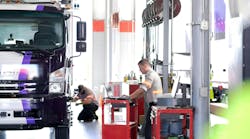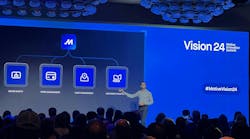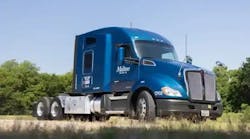"Fuel remains one of the largest expenses . . . and that cost is rising."
In the 15 years I have worked in the global transportation industry, it is safe to say on the eve of the new millennium that the outlook for the North American trucking industry has rarely, if ever, been better. A major issue and continuing challenge that the trucking industry is poised to address is one that spikes maintenance and operating costs, wastes fuel and contributes to our dependence on foreign oil, pollutes the environment, and contributes to driver fatigue and reduced safety: unnecessary idling.
Behind driver wages and equipment costs, fuel remains one of the largest expenses on fleet and owner-operator balance sheets. And that cost is rising. Yet the Dept. of Energy estimates the trucking industry wastes some 900-million gallons of diesel fuel a year literally going nowhere. Overnight idling of engines to provide cab heat and cooling is a major contributor to diesel fuel waste.
Excessive idling raises environmental concerns, too. Environmental concerns will shadow the trucking industry as the Environmental Protection Agency and U.S. state and Canadian provincial governments seek ways to curb diesel emissions. Here, again, auxiliary heating and cooling systems can play a role, eliminating the need to run the engine to provide heat, thereby eliminating the pollutants released into the air. Webasto is proud that our ThermoCooler auxiliary heating and cooling system is the first product certified by the EPA as a useful alternative to idling.
Auxiliary engine preheat and cab heating and cooling devices such as the ThermoCooler also help with another issue that our industry has been battling with increasingly for the past 15 years: driver safety and driver retention.
As the population of skilled truck drivers grows smaller and smaller each year, our industry must meet the challenge of recruiting and training new drivers while at the same time finding new and effective ways to retain drivers and lower a frightening turnover rate.
Yet one answer to this problem often lies in the very truck the driver is asked to move. Progressive fleets are seizing a competitive advantage by spec'ing their trucks with comfortable sleepers and seats, auxiliary cab heating and cooling systems, air ride suspension for reduced vibration, noise inhibitors, state-of-the art acoustics, computers, and fax machines, among other amenities.
Fatigue is another issue truck drivers must contend with. The key to fatigue sounds simple: get a good night's sleep. But that is often difficult to achieve.
Getting a good night's rest means: being comfortable, sleeping undisturbed by truck inspectors who are looking for over-emitting diesel engines; not waking up in order to turn over the engine and heat or cool the cab; sleeping soundly without the vibration of a diesel engine to wake you.
Auxiliary heating and cooling systems can eliminate some of the external elements that deprive truck drivers of sleep. They are but one tool to help fleets reduce fatigue among their drivers.
As trucking rolls into a new millennium, a slew of age-old problems is poised to come along for the ride. Our industry has the power to eliminate many of these roadblocks with rifle-shot precision by harnessing technologies such as auxiliary heating and cooling systems available today. Working together, we can make increased operating profits, safer and more satisfied drivers, reduced environmental pollution, and record growth hallmarks in the 21st century.


